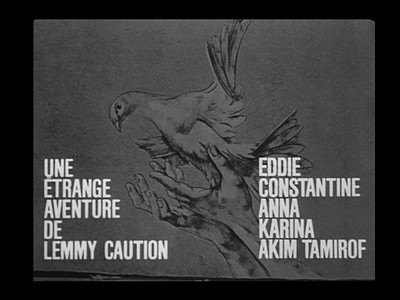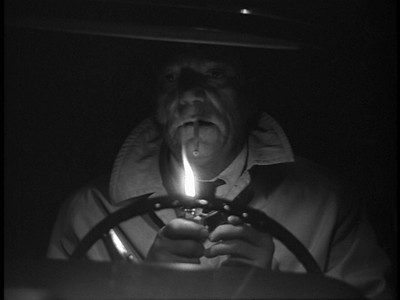
It's a shame there weren't more celebrated adventures of Lemmy Caution. Just for the name alone, it would be fun to hear him spoken of in the same circles as his American counterparts Sam Spade and Philip Marlowe. Despite there being a series of movies with the character, all played by the craggy, lantern-jawed Eddie Constantine, it appears his most challenging escapade is the only one that remains in circulation.
The hero of Jean-Luc Godard's 1965 sci-fi freak-out Alphaville wears a private detective's uniform, but he's really a secret agent masquerading as a journalist on an assassin's mission. He's every film noir heavy belted into one futuristic overcoat.

Alphaville, despite having a name built on the very roots of language, is a city where we are told oral communication is breaking down. Hence Godard's reliance on symbols and sounds, the piercing beeps and blips he inserts into the film at maximum volume being the most pronounced sign of any advanced technology. The genius of low budget science fiction like this is its complete lack of special effects or space-age sets. Nearly two decades before Blade Runner

The city is ruled by a giant computer called Alpha 60, and the construct acts as interrogator, mastermind, and sometimes narrator. The machine's dialogue is run through a mechanical distortion device, removing any recognizable tones that would help us identify the actor. I wouldn't be surprised if the super computer's lines were recorded by Godard himself, the grand joke that the ruler of Alphaville is the ruler of Alphaville. It's the same vocal technique the director employs for the Satanic figure in his 1993 movie Oh, Woe is Me. The sound of the voicebox is a signifier of an enemy of humanity.
Alpha 60's goal is to remove all emotion from human existence. The quest for knowledge is neutralized by the criminalization of the word "why," replacing it instead with the word "because." There is no pondering the reason, only stating the explanation. Denizens of the city have three options: assimilation, suicide, or execution. In one of his many pranks on classic movies, the last option is enacted in a swimming pool as some kind of demented Esther Williams routine. The condemned are dropped in the water and carnivorous bathing beauties descend on them like piranhas. Women as a whole are predatory, mollifying creatures in Alphaville. Most of the females Caution comes across are "seductresses third-class," dead-eyed trophy girls who distract with their bodies. One of Caution's stoolies (Akim Tamiroff) is snuffed out while in a lusty embrace with one of these gals, the secret agent in the background snapping pictures on his Instamatic. Likewise, the love interest, Natasha Vonbraun (Karina), the daughter of the scientist (Howard Vernon) who maintains Alpha 60 and Caution's target, is described by her eventual but distrusting paramour as a vampire with pointy teeth. It's not terribly kind, but at least he only shares this summation with us, his co-conspirators, rather than saying it out loud.

Lemmy Caution comes from the Outlands, the free communities beyond Alphaville that the sprawling city seeks to swallow. Once in the metropolis, Caution does little investigation. His battle with the machine consists of the two pushing ideas and concepts back and forth at one another. Godard loads his philosophical nuggets on thick, at a pace that is often difficult to keep up with. (And given that many are borrowed from Borges, hard to comprehend even if you can maintain the speed.) Natasha is used to simplify things; she says straight-out that it's really a battle of life or death. If Lemmy wins, humanity retains its sense of self; if Alpha 60, the whole of existence is sublimated to tyranny. The name Vonbraun, the initials "SS" spied in an elevator--the filmmaker is obviously drawing on the Nazis for his villains just as much as a technocratic power somewhere in the distance.
The one thing that the machine cannot contend with is the explosive qualities of human emotion. Just like any detective worth the gum on his shoe, when Caution has enough of talk, he resorts to violence. He goes on a shooting spree, using death to stop death. Yet, the Godard that thinks humanity is worth fighting for is also a romantic, and so the most human of emotions must also be reaffirmed. Caution must break Natasha's conditioning and remind her what it's like to feel.
At the finale, speeding out of Alphaville in that most space age of cars, the Ford Galaxy, Lemmy Caution takes Natasha toward the wilds of freedom. Her instinct is to turn back, to indulge her nostalgia for the safety they are leaving, but he keeps her eyes forward, lest she turn to a pillar of salt. He challenges her, demands she relearn and reclaim the vocabulary Alpha 60 took from her. Three words are the key to salvation.
"Je vous aime."
"I love you."


2 comments:
If I remember right, Alphaville was the first Godard film I ever saw. I've unfortunately lost my copy of the DVD, though I'm hoping that Criterion releases another edition with special features.
Anyway, I've yet to see it, but doesn't Lemmy Caution sort of return in Germany: Year Zero? Have you seen that one?
I'm having a ball reading through your blog, by the way.
Thanks, man. I think I have heard that Lemmy comes back in that movie, but I have not seen it.
I'd love to see Criterion tackle some of their early Godard films again. I'm also hoping we'll be seeing some of the other early films showing up there soon.
Thanks for reading!
Post a Comment